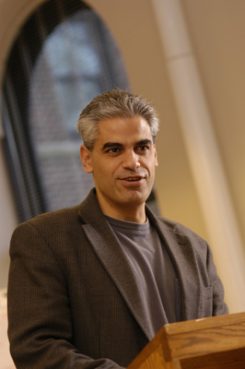
(RNS) Catholic theologian Miguel Diaz served as the U.S. ambassador to the Vatican. Religion News Service file photo courtesy Saint John’s School of Theology and Seminary.
VATICAN CITY (RNS) In a meeting with the new U.S. ambassador to the Holy See, Pope Benedict XVI praised Obama administration policies on arms control and inter-religious relations, but underscored a key area of disagreement by reaffirming the Catholic Church’s opposition to abortion.
Benedict made his remarks on Friday (Oct. 2) as he formally accepted the credentials of Miguel H. Diaz as Washington’s new envoy to the Vatican.
The pope voiced his “satisfaction” with a unanimous decision by the United Nations Security Council on Sept. 24, under the chairmanship of President Obama, to approve a U.S.-drafted resolution aimed at ridding the world of nuclear weapons.
Benedict, who has frequently called for strengthening the UN and other international bodies, praised the resolution as an instance of “multilateral engagement in approaching the urgent problems of the planet.”
Stressing the importance of inter-religious understanding to peace, particularly in the Middle East, Benedict said he noted “with appreciation your government’s desire to promote such cooperation as part of a broader dialogue between cultures and peoples.”
That statement may have been a reference to Obama’s speech last June at Egypt’s Cairo University, in which the president called for better relations with the Muslim world. The pope’s top spokesman at the time called the Cairo speech “very important” and “very significant” for world peace, and Diaz quoted the speech to the pope on Friday.
Praising the U.S. as an example of a “cohesive yet pluralistic society,” Benedict also seemed to note Obama’s historic election as the nation’s first black president.
“In recent months,” the pope said, “the reaffirmation of (America’s) dialectic of tradition and originality, unity and diversity has recaptured the imagination of the world.”
On a less harmonious note, Benedict called for the “protection of human dignity and respect for the inalienable right to life from the moment of conception to natural death, as well as the protection of the right to conscientious objection on the part of health care workers, and indeed all citizens.”
Obama supports abortion rights and embryonic stem cell research, which Catholic teaching forbids. The president has promised to support a “robust conscience clause,” exempting health care providers from participating in services — namely abortion, sterilization and contraception — to which they have moral objections. But critics say that health care reform legislation currently before Congress would fail to ensure such protections.
In his remarks, Diaz said that the pope’s “urgent priorities coincide with those set forth by President Obama,” specifically in the areas of inter-religious dialogue, the environment, world hunger, the financial crisis, and immigration.
The new ambassador pledged to cooperate with the Vatican “on issues related to interfaith, interracial, and intercultural conversations in order to advance the cause of peace and understanding among peoples.”
Diaz, 46, is the first theologian and the first Hispanic to serve as American envoy to the Vatican since Washington established formal diplomatic ties with the Holy See in 1984. A first-generation college graduate who emigrated from Cuba to the U.S. as a child, Diaz has taught theology at the College of Saint Benedict and St. John’s University in Collegeville, Minn., since 2004.
At confirmation hearings in July, Diaz told the Senate Foreign Relations Committee that his socially conscious scholarship gave him common ground with Benedict, a fellow theologian, enabling him to further U.S. policies and interests in areas including the Middle East peace process, dialogue with the Muslim world, bioethics and abortion.
Diaz was mum about his own views on abortion during those proceedings, but anti-abortion Catholics have criticized his support for Secretary of Health and Human Services Kathleen Sebelius, a Catholic who supports abortion rights.




